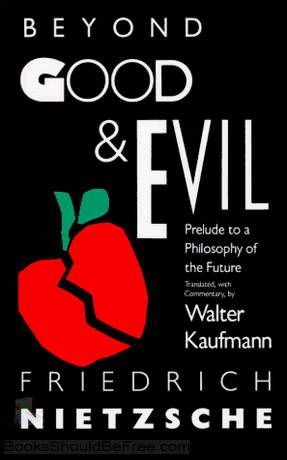Nietzsche Beyond Good and Evil Audiobook l 217 MB
Beyond Good and Evil (Unabridged)
Author: Friedrich Nietzsche
Narrator:
Steven Crossley
Translator:
Helen Zimmern
Running Time:
7 h 27 min
Beyond Good and Evil: Prelude to the Philosophy of the Future is basically a summary of Friedrich Nietzsche's philosophies and basic predictions for the future. First published in 1886, the book is made up of nearly three hundred statements ranging from one-line aphorisms to "rants" that are several pages in duration. In his book, Nietzsche denounces what he considers to be the meaningless moralities of nineteenth century scholars and thinkers. He criticizes his contemporaries for following Christianity and its morals without question. Essentially, Nietzsche has written Beyond Good and Evil as a critique of philosophy, religion, science, politics, and ethics. He feels that his contemporaries are proceeding in the wrong direction; he has no qualms about revealing their mistakes.
Because of Nietzsche's attitudes and criticism toward his contemporaries, Beyond Good and Evil functions as a note to future thinkers, a warning per se about what is to come and what to avoid. However, it is apparent that Nietzsche had plenty of advice for his audience; quite possibly even too much. Though Nietzsche touched on important themes such as truth and morality, his somewhat manic and cyclic style, as well as the abundance of information that he included in his book transformed what was intended to be a manual for future thinkers into a chaotic diatribe in which too many ideas are presented.
Beyond Good and Evil is one of Nietzsche's most important works and, although it is relatively easy to read, it is one of the more difficult to fully grasp on a first reading. The thesis is, as the title alludes, that morality is ultimately relativistic - that right and wrong are not absolutes but are considerably flexible - and variable in different societies at all times.
Although he qualifies his views as opinions rather than facts and asks his readers to examine his premises critically before agreeing with his views, Nietzsche leaves no doubt that he is confident that all previous philosophers were wrong about important precepts and he alone is right. His criticism of his immediate predecessors is somewhat more restrained than in some of his other works and directs his harshest criticism at Plato for his fabrications of "Pure Spirit and Transcendental Goodness."
Nietzsche was fervently opposed the prevailing religious concepts of morality. His reputation as being anti-Christian was, and still is, sufficient grounds to inspire considerable criticism of his philosophy. As much as his critics might disagree with Nietzsche's philosophy, they cannot simply dismiss it. Nietzsche intelligence and persuasiveness make him a formidable figure in field of moral philosophy. His influence on modern philosophical theory is considerable and it is likely that his contributions will continue to inspire controversy for some time to come.
Link :
Code:http://uploaded.net/file/a68naa5y/Nietzsche-Beyond.Good.and.Evil.1886.AUDIOBOOK-PHC.rar
Please visit our sponsors
Results 1 to 1 of 1
-
02-02-2014, 08:50 PM #1Senior Investor

- Join Date
- Jan 2012
- Posts
- 7,166
- Feedback Score
- 0
- Thanks
- 0
- Thanked 6 Times in 6 Posts
 Nietzsche Beyond Good and Evil Audiobook
Nietzsche Beyond Good and Evil Audiobook
-
Sponsored Links
-
Sponsored Links
Thread Information
Users Browsing this Thread
There are currently 1 users browsing this thread. (0 members and 1 guests)
24 Hour Gold
Advertising
- Over 20.000 UNIQUE Daily!
- Get Maximum Exposure For Your Site!
- Get QUALITY Converting Traffic!
- Advertise Here Today!
Out Of Billions Of Website's Online.
Members Are Online From.
- Get Maximum Exposure For Your Site!
- Get QUALITY Converting Traffic!
- Advertise Here Today!
Out Of Billions Of Website's Online.
Members Are Online From.






 LinkBack URL
LinkBack URL About LinkBacks
About LinkBacks








